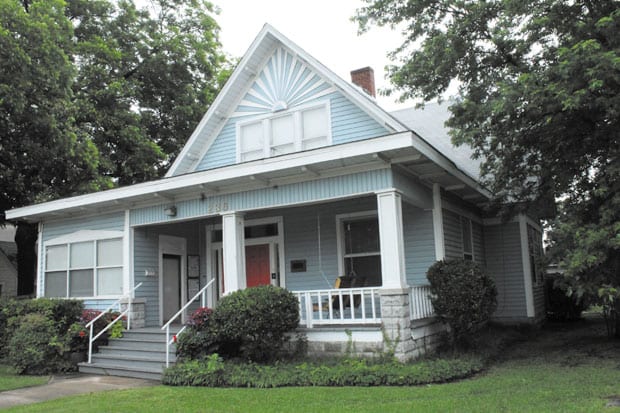Promise House offers homeless youth a chance to thrive, including the LGBT youth

Two of the houses operated by Promise House in Oak Cliff, including Wesley House, right, for pregnant teens and new moms. (David Taffet/Dallas Voice)
DAVID TAFFET | Senior Staff Writer
Darron Moore has seen clients come back six, seven, eight years after leaving Promise House to say thank you. They tell him, he said, “Hey, you helped me out at a time I desperately needed it.”
Moore doesn’t just consider his position first as case manager and now as outreach and community relations manager just a job. “We are part of their life,” he said of the young people who find refuge at Promise House. The facility, located in Oak Cliff, shelters homeless youth and is Black Tie Dinner’s newest beneficiary.
Moore called his organization one of Dallas’ best-kept secrets, especially when it comes to the LGBT community.
That’s surprising, considering that LGBT youth represent between 30 and 43 percent of all clients served by drop-in centers, street outreach programs and housing programs nationwide. Promise House is no different.
 Moore’s current goal is to open another house under the organization’s umbrella to specifically address the needs of homeless LGBT youth.
Moore’s current goal is to open another house under the organization’s umbrella to specifically address the needs of homeless LGBT youth.Youth arrive at Promise House through a number of circumstances. Some have been removed from their homes by Child Protective Services. Others are runaways, often escaping abuse at home. And some have been thrown out of their homes by parents who have religious objections to the youth’s sexual orientation or gender identity, because the teen got pregnant or a variety of other reasons.
And others have homeless parents and were lucky enough to be referred to the safety of the Oak Cliff sanctuary.
Youth in the transitional living program can either go to the school they came from or switch to a school in the area, if they’re Dallas residents. Others finish their schooling at Dallas Can Academy, which specializes in students who have struggled in a traditional high school setting and which is located just a few blocks away from Promise House.
DISD operates two classrooms for youth who can’t safely go out into the community.
Promise House operates out of two large houses and a more institutional-styled brick building built in the mid 1990s to serve the growing homeless youth population. The original house that Promise House has been operating since 1984 now houses up to 12 homeless pregnant teens and teen moms with their children.
Moore said he never underestimates homeless youth: “Some of these kids have gone through amazing stuff. They’re resilient.
“Some of the staff,” he added, “become their support system.” In fact, one youth, who had escaped from a human trafficking situation, recently invited Moore to attend his high school graduation.
Although Promise House’s main objective is to get youth through high school and out on their own with either a full-time job or into college, the agency doesn’t just abandon them when they turn 18.
Moore said one resident recently received a PGA scholarship. One Carter High School valedictorian that lived at Promise House is now in UT Law School. While staff helps their youth apply for student loans and financial aid, Promise House also has its own generous scholarship program that ensures its grads will get the education they deserve.
Another program helps youth transition into the community. When they’re ready to leave and have a job, Promise House will help them by paying up to $560 for security deposit or part of the first month’s rent. They can also take some of their furniture to get them started in their own apartment.
Zach Bartush is volunteer and community resources coordinator. He’s concerned with some of the special needs homeless LGBT youth have. Resource Center recently did a training session with staff that he said came up with a variety of very easy and practical suggestions that cost nothing to implement — things like using the correct pronoun and having gender-neutral bathrooms, and letting trans youth just live comfortably and explore who they are — just like any teen kid does.
In the two houses, the bathrooms are already gender-neutral, like in the houses everyone grew up in. Stop making a big deal about it when a trans youth uses the bathroom, Bartush advised. He said staff needs to make a concerted effort to connect trans youth to medical resources that can help them discuss and make plans for the future.
“We’ve always been a positive organization,” Bartush said. “We just have to equip staff to help.”
Bartush is proud of the organization, but couldn’t be a case manager, he said, because he gets too upset when he hears some of the young people’s stories. One resident, whose mother was active in her church, was thrown out of his house at 16 when he came out. To survive on the street, he did sex work and contracted HIV before he was referred to Promise House. The staff at Promise House got him stabilized, on medication and back into school.
Bartush said once they provide the basic needs — food, shelter, education — they get their residents into counseling and into a program that will prepare them not just for life, but for a successful life. That’s the goal with every young person that walks through the Promise House doors.
This article appeared in the Dallas Voice print edition June 17, 2016.

